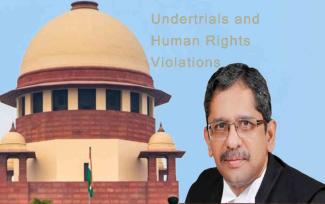The current Chief Justice of India (CJI), N.V. Ramana, spoke in August this year about the state of human rights in the country and the role that the Supreme Court should play to defend justice. In his speech delivered at the Vigyan Bhawan in Delhi on 8 August, he said that police stations “pose significant threats to human rights and bodily integrity”. Interrogation involving torture and horrific inflection of mental and physical pain, while illegal, is rampant. He also spoke of how the system, in its current state, does not defend rights of undertrials. He pointed that to the great detriment of undertrials, the detained and the arrested are often denied legal representation. The CJI’s statements tell us that the widespread nature of rights abuse in Indian prisons has made it impossible for the forces-that-be to deny its existence.
As human rights defenders, there is a need today to fight for the rights of undertrials. Today, under the present dispensation, the ‘judicial’ process itself is the punishment. We are seeing multiple instances of laughable and ridiculous charges being foisted on vocal opponents of the ruling regime. These charges are followed by prolonged incarceration of the accused, based on fake or no evidence. In most cases, the accused is finally declared not guilty, after a long stint in jail. This final acquittal, however, can hardly be termed justice. If the Supreme Court is serious about justice, the CJI and their team must ensure the following:
- Arbitrary and unnecessary arrests must stop. Magistrates must not authorize detention casually and mechanically. Pre-trial incarceration cannot be the rule.
- A timeline for trials must be fixed and capped for say 3-6 months, or a maximum of one year.
- All undertrials languishing in jails must be released immediately on bail.
- Cases, which are pending at evidence stage for a long time on account of failure to produce witnesses or evidence, must be closed within a time frame.
- A programme of action must be in place to combat the digital divide.
- The police system acts in a proactive manner when it comes to arrests and detentions. However, the poor, the marginalised and the politically vulnerable in particular have poor access to the justice system. A free and easily available legal aid system should proactively reach out to the poorest of poor, dalits, adivasis and the vulnerable living outside the system of justice.
- A recent Supreme Court order has directed installation of CCTV cameras in all police stations and offices of central investigation agencies. This has to be done immediately to prevent violence on those arrested.
In addition to these procedural reforms, it is important to mention here that the existence of draconian legislations is a major obstacle in the direction of ensuring human rights. It is a blatant violation of justice today that human rights defenders are being detained under UAPA and similar draconian laws. These should be deemed illegal, as they curtail the rights as enshrined under the constitution. Along with the above mentioned reforms in judicial and police procedure, such legislations should go.











